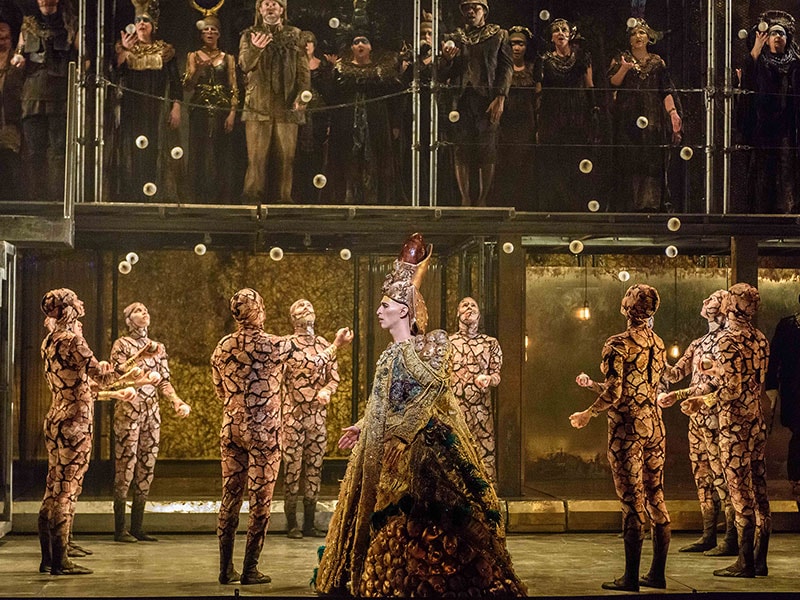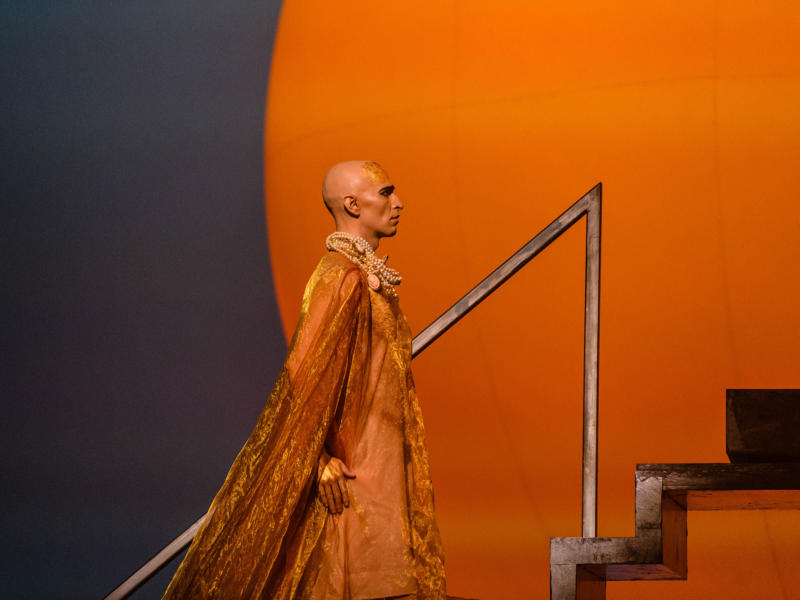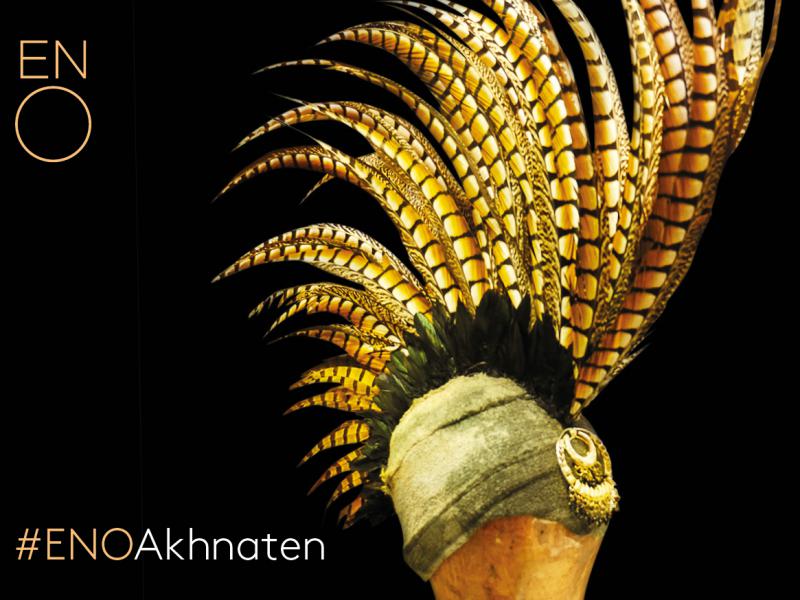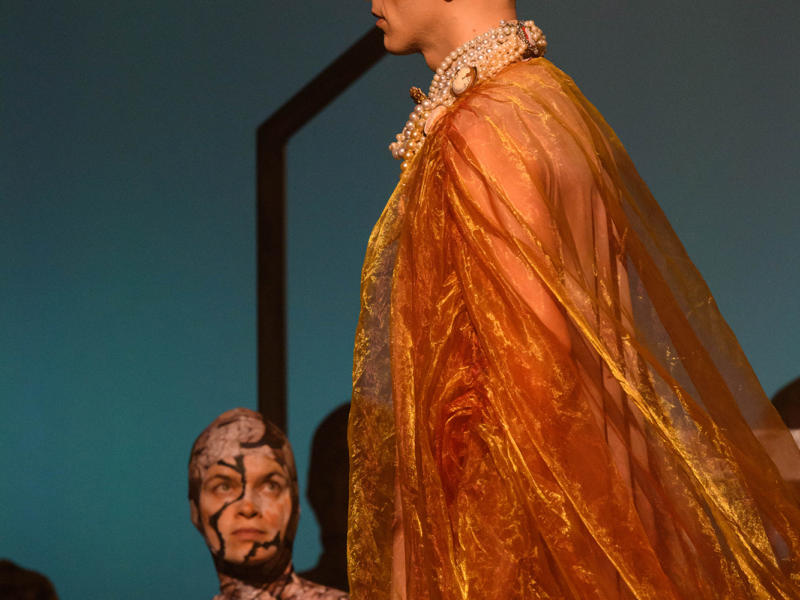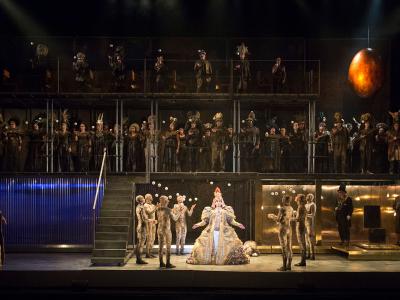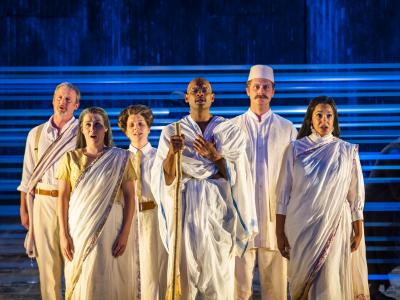Discover Akhnaten
Watching Philip Glass‘s Akhnaten is a thought-provoking, absorbing experience.
This extraordinary work forms the last of Glass’s trilogy of ‘portrait’ operas in which he looks at figures from the fields of science (Einstein), politics (Gandhi) and religion (Egyptian pharaoh Akhenaten).
Akhnaten uses texts drawn from ancient hymns, prayers, letters and inscriptions sung in their original Egyptian, Hebrew and Akkadian to explore the life of the Egyptian pharaoh who fathered a new religion. Keep reading for a detailed overview of Akhnaten’s story, along with teaser trailers and production images.
Synopsis
Act I
Year 1 of Akhnaten’s reign. Thebes
Funeral of Amenhotep III
The opera begins with the death of Amenhotep III. We see him first revealed both as a corpse and as a ghostly figure, reciting words taken from the Egyptian Book of the Dead. During the ceremony we see a sacred ritual performed in which the body’s organs are carefully taken out and placed into canopic jars and the body is wrapped and embalmed. A ceremony takes place that represents a ritual occurring in the Book of the Dead, in which the Pharaoh’s heart is weighed against a feather; if his heart is as light as this it will ensure that Amenhotep will travel through into the afterlife.
Coronation of Akhnaten
The figure of Amenhotep’s son steps forward and the coronation ceremony begins. The new pharaoh is dressed in sacred robes and the crowns representing Upper and Lower Egypt are brought together to symbolise Amenhotep IV’s power over all of Egypt. Once he is crowned the new Pharaoh rises up the stairs to make his first pronouncement.
The Window of Appearances
At the Window of Appearances the Pharaoh reveals his intentions to form a monotheistic religion. He changes his name from Amenhotep IV (meaning ‘spirit of Amon’) to Akhnaten (meaning ‘spirit of Aten). Aten, the sun god, is glorified by Akhnaten, his wife Nefertiti, and Queen Tye, his mother. As the trio make their pronouncement at the window, the sun rises behind them.
Act II
Years 5 to 15. Thebes and Akhetaten
The Temple
Akhnaten and Queen Tye begin to make the changes that he has promised. He leads a revolt to banish the old religion and replace it with his own. Akhnaten enters the temple and finds the priests performing the old religious rituals. Akhnaten banishes them and forms the new order of Aten.
Akhnaten and Nefertiti
A simple duet is performed by Akhnaten and Nefertiti, which affirms their love for each other.
The City
The site for a new city is chosen carefully. The new city of Akhetaten – ‘The City of the Horizon of Aten’ – is built in praise of the new religion.
The Hymn
Akhnaten sings a private prayer to his god. His vision of a new religion and a new society is complete.
Act III
Year 17 and the present. Akhetaten
The Family
Akhnaten and Nefertiti dwell in an insular world of their own creation with their six daughters. Meanwhile Queen Tye is uneasy. She senses unrest beyond the city’s walls. Crowds gather outside the gates and letters arrive expressing increasing concern about Akhnaten’s self-imposed isolation.
Attack and Fall
The priests of Amon emerge from the gathering crowds and break through the palace doors. The daughters try to escape and are drawn away from Akhnaten and into the swelling mass. Queen Tye and Nefertiti are also separated from Akhnaten, who is finally killed.
The Ruins
Akhnaten’s father mourns his son’s death. Meanwhile the new Pharaoh, the young Tutenkhamun, is crowned in a ceremony similar to that of his father, and the old polytheistic religion is restored.
Intercutting this ceremony, a group of modern-day students is listening to a lecture given by a professor.
Epilogue
The ghosts of Akhnaten, Nefertiti and Queen Tye are heard from the ancient world once again.
How long is the opera Akhnaten?
A performance of Akhnaten at the ENO’s London Coliseum is roughly 2hrs 55mins, with two intervals.
Who wrote Akhnaten?
Akhnaten was written by American composer, Philip Glass (born 1937), one of the most influential contemporary composers. Known for his mesmerising operas, famous movie soundtracks and minimalist compositions, his music transcends all genres and audiences.
When was Akhnaten written?
Akhnaten was written in 1983 as part of a trilogy of ‘portrait’ operas based around different themes and historical figures.
What is the story of the opera Akhnaten?
Akhnaten follows the rise and fall of the Egyptian pharaoh Akhnaten, primarily known for his radical shift in religion to switch from worshipping a pantheon of gods to just one: the Sun.
What language is Akhnaten written and sung in?
Philip Glass’s Akhnaten draws on ancient hymns, prayers and inscriptions sung in their original Egyptian, Hebrew and Akkadian.
Where can I watch Akhnaten opera?
To experience the Olivier Award-winning production, book your tickets to see Akhnaten at the London Coliseum.

